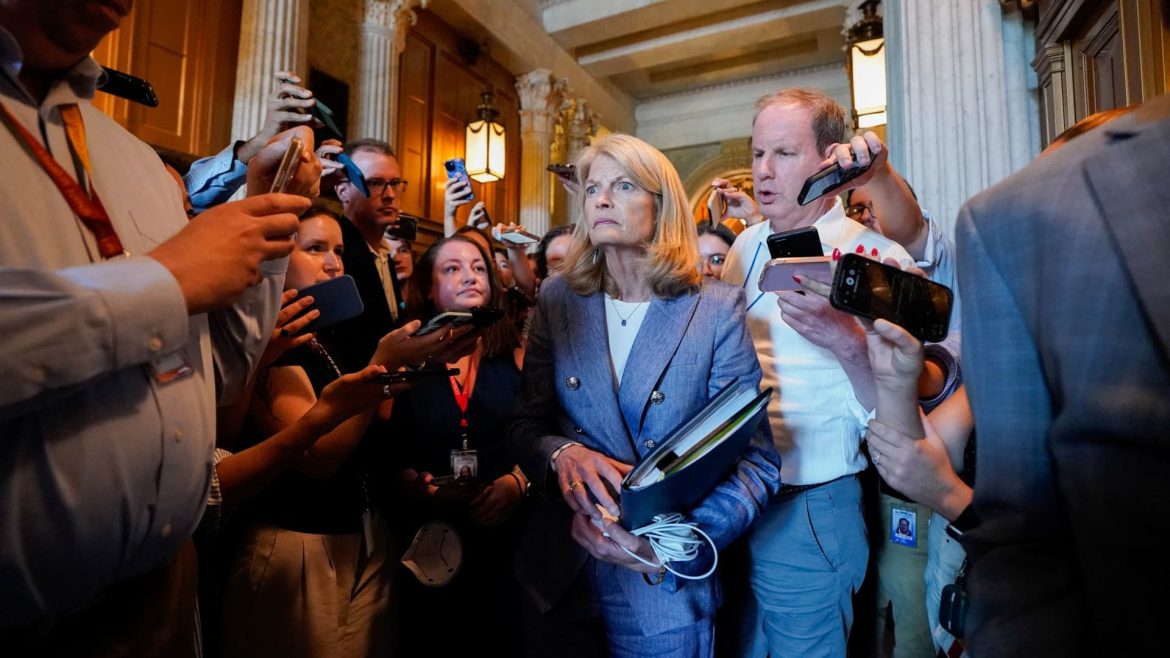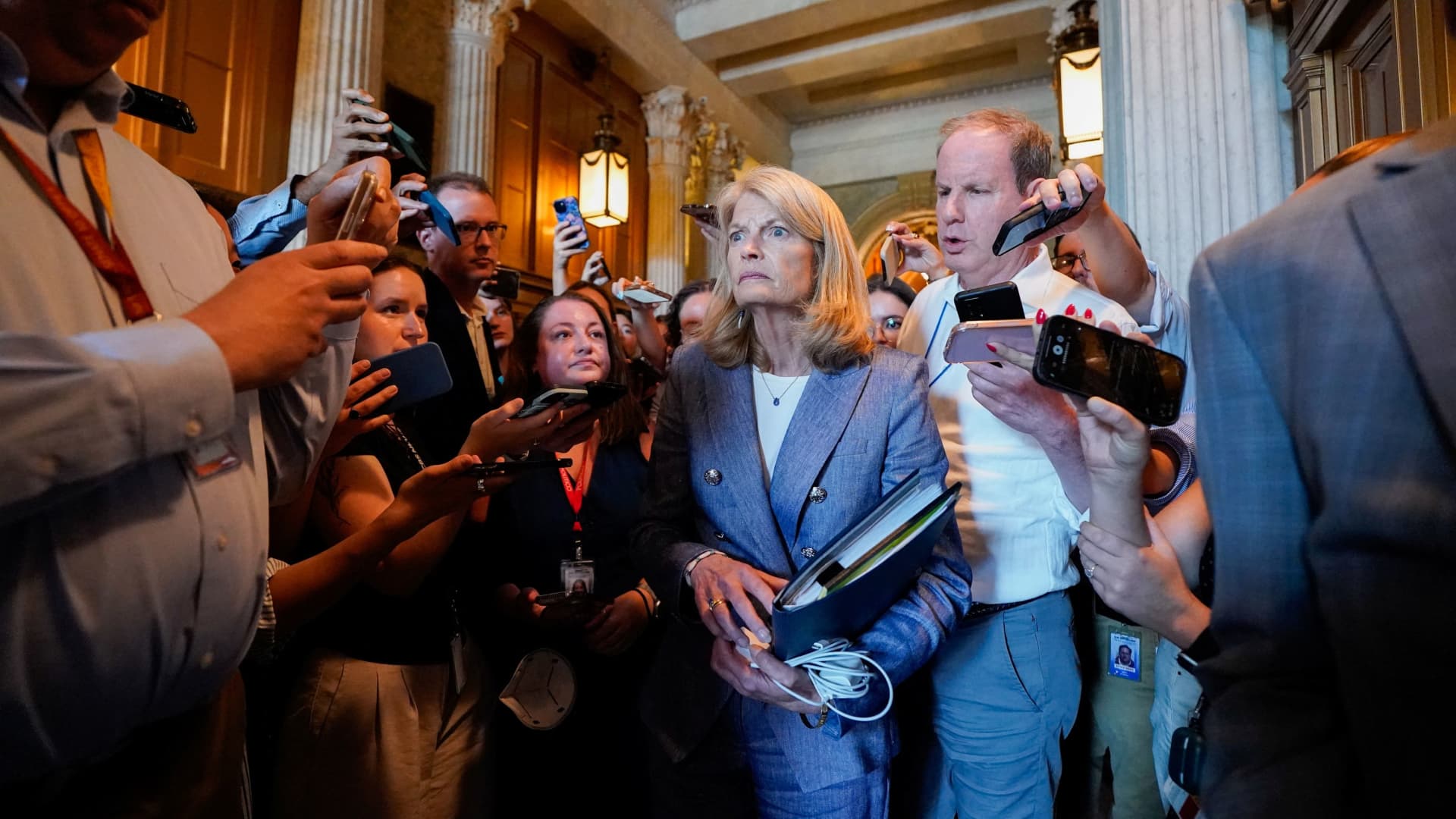Senator Lisa Murkowski’s recent vote in favor of President Trump’s “big, beautiful bill” has sparked intense debate, highlighting the intricate dynamics of political maneuvering, regional interests, and the challenges of governing a diverse nation. The bill’s narrow passage in the Senate was contingent on Murkowski’s support, which came with a critical condition: a specific exemption for Alaska. This event underscores the delicate balance senators must strike between national agendas and the needs of their constituents.
A Vote Cast in Agony?
Murkowski’s decision was far from straightforward. She described the vote as “agonizing,” reflecting the immense pressure she faced from both her party and her constituents. On one hand, there was the expectation to deliver a victory for President Trump and the Republican Party. On the other, there were deep concerns about the bill’s potential impact on vital social safety nets, particularly Medicaid and the Supplemental Nutrition Assistance Program (SNAP). These programs are not abstract concepts; they represent real Alaskans who rely on them for essential support.
Murkowski’s reservations were not merely performative. She openly voiced her misgivings in the weeks leading up to the vote, demonstrating a commitment to representing her constituents’ needs, even when they conflicted with the broader Republican agenda. This stance sets her apart as a politician willing to prioritize local welfare over strict party allegiance. Her willingness to buck party lines highlights a commitment to representing her constituents’ needs, even when those needs clash with the broader Republican agenda.
The Alaskan Carveout: A Deal with the Devil or a Victory for the North?
The pivotal moment arrived when Murkowski secured a two-year exemption for Alaska from the bill’s stricter food stamp rules. This “carveout” became the linchpin of her support. But what exactly does this exemption entail, and why is it so important for Alaska?
Alaska faces unique challenges related to food security. Its remote communities, harsh climate, and high cost of living make access to affordable food a persistent struggle. The existing SNAP program plays a critical role in bridging this gap, ensuring that vulnerable populations have access to essential nutrition. The proposed changes to SNAP, without considering these unique Alaskan realities, could have had devastating consequences.
The two-year exemption offers Alaska a temporary reprieve, allowing the state time to adapt to the new rules and potentially negotiate a more sustainable solution. Murkowski argued that this was not simply a matter of securing federal dollars but ensuring the well-being of her constituents. This action can be seen as a shrewd negotiation, turning potential harm into a temporary advantage for her state.
More Than Just Food Stamps: The Broader Implications
While the SNAP exemption garnered much attention, it’s essential to consider the broader context of Trump’s “big, beautiful bill” and its potential impact on Alaska. The bill encompasses a wide range of tax and spending provisions, many of which could have significant consequences for the state’s economy and its residents.
Alaska’s economy is heavily reliant on natural resources, particularly oil and gas. Any changes to federal tax policies related to these industries could have a direct impact on the state’s revenue stream. Moreover, cuts to federal programs that support infrastructure development, healthcare, and education could disproportionately affect Alaska’s remote and underserved communities.
Murkowski’s “yes” vote, despite her reservations, suggests a calculated assessment of these competing factors. Perhaps she believed that the benefits of the bill, such as potential economic growth or tax relief for certain segments of the population, outweighed the risks associated with cuts to social safety nets. Or perhaps she felt that securing the SNAP exemption was the best she could do to mitigate the negative consequences for her constituents.
The House Fight and Beyond
The passage of the bill in the Senate is only one chapter in this ongoing saga. The bill now heads to the House, where it is expected to face further scrutiny and potential amendments. Murkowski herself has expressed hope that the House will send the bill back to the Senate with changes, suggesting that she views the current version as far from perfect.
The House debate will likely center on many of the same issues that dominated the Senate deliberations: the impact on social safety nets, the fairness of the tax cuts, and the overall fiscal responsibility of the bill. Representatives from states with similar concerns to Alaska may seek to emulate Murkowski’s strategy, demanding carveouts or amendments to protect their constituents’ interests.
Murkowski’s Legacy: A Pragmatist or a Party Loyalist?
Lisa Murkowski’s vote on Trump’s megabill raises profound questions about the nature of political representation and the role of individual senators in a highly polarized environment. Was she a pragmatic dealmaker, securing the best possible outcome for her constituents in a difficult situation? Or was she ultimately a party loyalist, willing to compromise her principles to advance the Republican agenda?
The answer, as with most things in politics, is likely somewhere in between. Murkowski’s actions reflect a complex calculus of competing interests and priorities. She demonstrated a willingness to stand up to her party and fight for her state, but she also recognized the need to compromise and find common ground.
Navigating the Political Tightrope
Ultimately, Murkowski’s vote highlights the ongoing tension between national politics and local realities. Her actions serve as a potent reminder that senators are not simply rubber stamps for their party’s agenda. They are representatives of their constituents, tasked with the difficult job of balancing competing interests and making tough choices that will have a real impact on people’s lives. This episode offers a fascinating glimpse into the intricate dance of negotiation, compromise, and strategic calculation that defines modern American politics. It’s a story not just of a bill passed, but of a senator navigating the complexities of power while trying to stay true to the needs of her Alaskan community.





